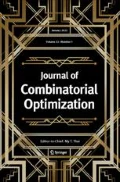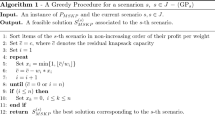Abstract
We introduce and asses several Divide-and-Conquer heuristic strategies, aimed at solving large instances of the 0–1 Minimization Knapsack Problem. The method subdivides a large problem in two smaller ones (or recursive iterations of the same procedure), in order to lower down the global computational complexity of the original problem, at the expense of a moderate loss of quality in the solution. Theoretical mathematical results are presented to assure a successful algorithmic application of the method and to suggest the potential strategies for its implementation. In contrast, due to the lack of theoretical results, the solution’s quality deterioration is measured empirically by means of Monte Carlo simulations for several types and values of the chosen strategies. Finally, introducing parameters of efficiency we suggest the best strategies depending on the data input.








Similar content being viewed by others
References
Baños R, Gil C, Ortega J, Montoya FG (2003) Multilevel heuristic algorithm for graph partitioning. In Workshops on applications of evolutionary computation, p 143–153. Springer
Blum C, Roli A (2003) Metaheuristics in combinatorial optimization: overview and conceptual comparison. ACM Comput Surv 35(3):268–308
Blum C, Puchinger J, Raidl GR, Roli A (2011) Hybrid metaheuristics in combinatorial optimization: a survey. Appl Soft Comput 11(6):4135–4151
Chris W (2008) Multilevel refinement for combinatorial optimisation: boosting metaheuristic performance. Hybrid metaheuristics. Springer, Berlin, pp 261–289
Glover F, Hanafi S (2002) Tabu search and finite convergence. Discret Appl Math 119(1):3–36 Special Issue devoted to Foundation of Heuristics in Combinatorial Optimization
Gross Jonathan L, Jay Y (2006) Graph theory and its applications. Discrete mathematics and its applications. Chapman and Hall, Boca Raton
Gutjahr WJ (2003) A converging ACO algorithm for stochastic combinatorial optimization. In: Albrecht A, Steinhöfel K (eds) Stochastic algorithms: foundations and applications. Springer, Berlin, pp 10–25
Gutjahr WJ (2010) Convergence analysis of metaheuristics. Springer, Boston, pp 159–187
Hanafi S (2001) On the convergence of tabu search. J Heuristics 7(1):47–58
Juan AA, Faulin J, Grasman SE, Rabe M, Figueira G (2015) A review of simheuristics: extending metaheuristics to deal with stochastic combinatorial optimization problems. Oper Res Perspect 2:62–72
Kellerer H, Pferschy U, Pisinger D (2004) Knapsack problems. Discrete mathematics and its applications. Springer, Berlin
Lin EY-H (1998) A bibliographical survey on some well-known non-standard knapsack problems. Inf Syst Oper Res 36(4):274–317
Martello S, Pisinger D, Toth P (1999) Dynamic programming and strong bounds for the 0–1 knapsack problem. Manag Sci 45(3):414–424
Patrick B (1995) Probability and measure. Wiley series in probability and mathematical statistics. Wiley, New York
Pisinger D (2005) Where are the hard knapsack problems? Comput Oper Res 32(9):2271–2284
Silvano M, Paolo T (1990) Knapsack problems: algorithms and computer implementations. Wiley-Interscience series in discrete mathematics and optimization. Wiley, West Sussex
Voss S, Maniezzo V, Stützle T (2009) Matheuristics: Hybridizing metaheuristics and mathematical programming (annals of information systems)
Wilbaut C, Hanafi S, Salhi S (2008) A survey of effective heuristics and their application to a variety of knapsack problems. IMA J Manag Math 19(3):227–244
Acknowledgements
The first Author wishes to thank Universidad Nacional de Colombia, Sede Medellín (https://medellin.unal.edu.co) for supporting the production of this work through the project Hermes 45713, as well as granting access to Gauss Server, financed by “Proyecto Plan 150x150 Fomento de la cultura de evaluación continua a través del apoyo a planes de mejoramiento de los programas curriculares”, where the numerical experiments were executed. The second Author wishes to thank Universidad EAFIT (http://www.eafit.edu.co) for its financial support as MSc student, through the Internal Grant 819156 “Modelos matemáticos y métodos de solución a un tipo de problema logístico que involucha agrupamiento de clientes, distribución y ruteo”. The authors also wish to thank the anonymous referees whose meticulous review and insightful suggestions enhanced substantially the quality of this work. Special thanks to Professor Daniel Cabarcas (https://sites.google.com/a/unal.edu.co/dcabarc/) from Universidad Nacional de Colombia, Sede Medellín for his help in understanding and running the code COMBO from Martello et al. (1999).
Author information
Authors and Affiliations
Corresponding author
Additional information
Publisher's Note
Springer Nature remains neutral with regard to jurisdictional claims in published maps and institutional affiliations.
Rights and permissions
About this article
Cite this article
Morales, F.A., Martínez, J.A. Analysis of Divide-and-Conquer strategies for the 0–1 minimization knapsack problem. J Comb Optim 40, 234–278 (2020). https://doi.org/10.1007/s10878-020-00584-2
Published:
Issue Date:
DOI: https://doi.org/10.1007/s10878-020-00584-2




